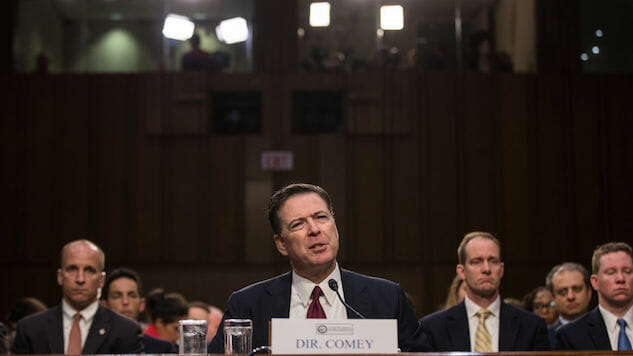These Mainstream Media Stories Now Appear Wrong After Comey’s Testimony
Photo by Drew Angerer/Getty
Ex-FBI Director James Comey’s scintillating testimony yesterday throws into question many news outlets’ recent reporting methods and stories. The issue here appears to be the validity of the sources behind several recent news stories.
CNN and ABC were both forced to run corrections after publishing articles before Comey’s testimony that claimed he would refute Trump’s claim that Comey told him on three separate occasions that Trump was not under investigation. Comey directly addressed those allegations, and confirmed that he did, in fact, tell Trump the president wasn’t under investigation on three separate occasions.
The CNN report was based on “unnamed sources” and compiled by four CNN journalists. Gloria Borger—a journalist on the report and CNN’s chief political analyst—even claimed on live television that Comey would refute Trump stating:
Comey is going to dispute the president on this point if he’s asked about it by senators, and we have to assume that he will be. He will say he never assured Donald Trump that he was not under investigation, that that would have been improper for him to do so.
Except that is exactly what Comey said happened in his written testimony:
Prior to the January 6 meeting, I discussed with the FBI’s leadership team whether I should be prepared to assure President-Elect Trump that we were not investigating him personally. That was true; we did not have an open counter-intelligence case on him. We agreed I should do so if circumstances warranted During our one-on-one meeting at Trump Tower, based on President Elect Trump’s reaction to the briefing and without him directly asking the question, I offered that assurance.
For ABC, their now-corrected report claimed:
Comey has told associates he will not corroborate Trump’s claim that on three separate occasions Comey told the president he was not under investigation as part of the probe into Russian meddling in the U.S. election, a source familiar the former director’s thinking told ABC News
Clearly, they were wrong, but why?
On February 14, the New York Times published an article titled, “Trump Campaign Aides Had Repeated Contacts With Russian Intelligence”. According to Comey’s testimony, this report is largely false:
In the main, it was not true. The challenge, and I’m not picking on reporters, about writing stories about classified information is the people talking about it often don’t really know what’s going on and those of us who actually know what’s going on are not talking about it… And we don’t call the press and say, ‘Hey, you got that thing wrong.’
-

-

-

-

-

-

-

-

-

-

-

-

-

-

-

-

-

-

-

-

-

-

-

-

-

-

-

-

-

-

-

-

-

-

-

-

-

-

-

-








































